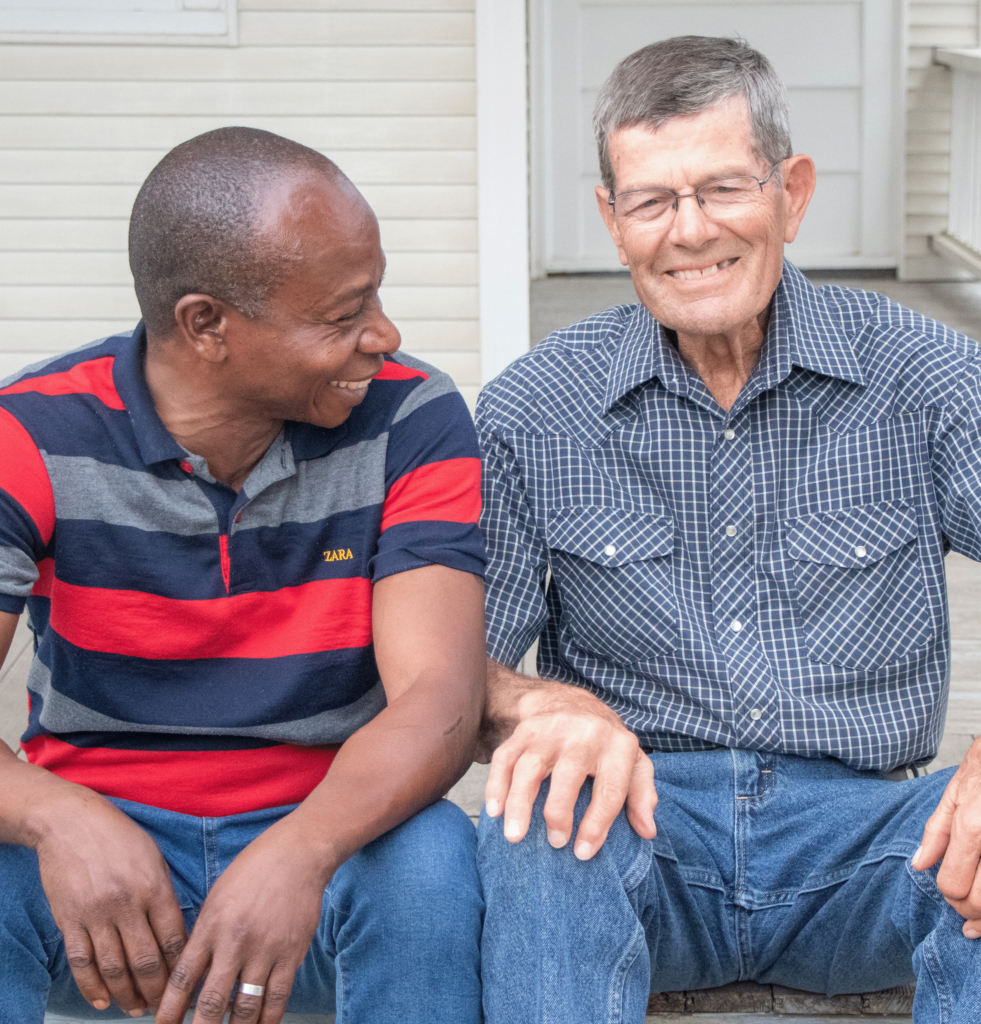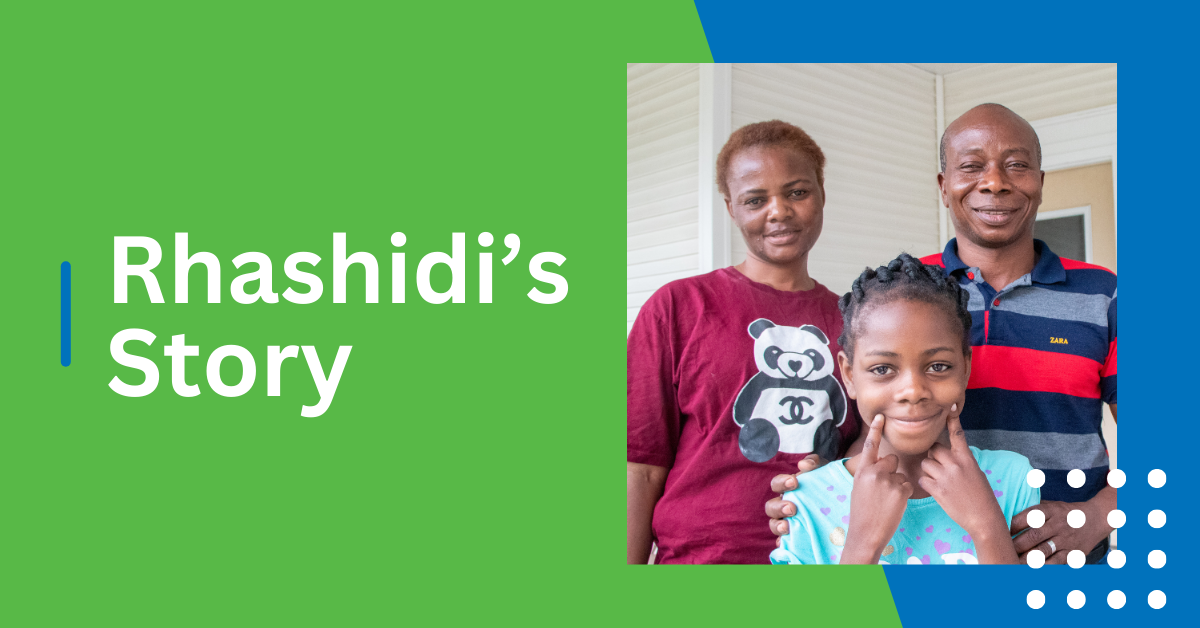
Pictures of Kahamu Rashidi‘s children hang on Dan Bean’s fridge next to snapshots of his grandchildren. It symbolizes a father-son bond formed during a chance meeting in an African refugee camp in 2018 and eventually led to the family’s resettlement near Dan’s home in Marshalltown.
Three years after first meeting, in 2021, Kahamu’s family was selected for resettlement in the United States. Dan and his wife Sylvia, along with Abdullahi Hiret, a program supervisor with LSI, met the family at the Des Moines airport in 2023.
Seeing Dan and hearing a familiar language was overwhelming. Dan and Kahamu had kept in touch over WhatsApp all those years, and Abdullahi also speaks Swahili.
“I was very happy. I could cry,” Rashidi said. “I can’t forget that day when I saw Dan. He knew me. I was not alone. There was somebody with me. I had reached a new land, and I’m safe.”
Dan invited Kahamu to resettle in Marshalltown, where Dan lives. He also asked the Kaamu family to stay with him and his wife until the family could get settled.
Dan and Sylvia enjoyed having house guests, and tutored the family on navigating the American culture, from table etiquette to how coins can make change. In Zimbabwe, there were only U.S. bills.
Understanding America’s cultures and norms is one of the reasons LSI offers cultural orientation courses for new refugees. LSI’s Des Moines staff assisted 252 new arrivals in 2022, and Sioux City staff had 62.
“Now he is family,” Kahamu said of Dan. “They received me and accepted me. I feel I have a home because of how Dan has connected me to the community. This is my town.”
While most refugee families rely on LSI’s resettlement services to find an apartment and volunteers and donors to furnish it and set it up, Dan wanted to do more than just welcome Kahamu’s family. He contacted members of his church and friends, who donated items and set up Kahamu’s Marshalltown home.
“There are so many good people,” Abdullahi said. “There are so many who like to help, who like to welcome new Iowans.”
Fleeing home
Dan was visiting refugee camps in 2018 to scout out a future youth mission trip for his son, a school principal. Seeing a “mzungu,” or “white man,” Kahamu struck up a conversation and invited Dan to see his home.
His family — including wife, Salima, and six children — had lived in the Tongogara Refugee Camp in eastern Zimbabwe since fleeing Congo in 2012 during the country’s civil war.
While working as a nurse, Kahamu and his coworkers were confronted by M23 rebels. At gunpoint, they demanded Kahamu and others work for them in the bush. When they resisted, the rebels killed a doctor in front of them.
When the rebels left the room, Kahamu and his coworkers stacked furniture to climb through the hospital’s ceiling and roof to escape. He ran to his home, where his wife was in tears. The rebels had killed people she knew and kidnapped others.
Kahamu gathered Salima and their children, and they fled to a nearby village. They carried documents and small household items, thinking they would be away from home only a short time.
But the rebels were there, too, and destruction was everywhere. Soon it became evident they wouldn’t be safe in Congo, so they entered a refugee camp in Zimbabwe.
From a refugee camp to Iowa
Kahamu’s family was caught in a Catch-22, Abdullahi explained. The rebels wanted to kill them for fleeing the hospital and not working for their side, and the government did not trust them because Kahamu had worked at a hospital overtaken by the rebels.
Resettling in the United States is a long process, including 12 screening steps by the U.S. and international authorities, such as the United Nations, FBI, Department of Defense, Department of Justice, Department of State, Department of Homeland Security, and U.S. Citizenship and Immigration services.
Refugees undergo background checks, fingerprint verification, medical screening, and in-person interviews.
“They will ask you questions again and again why you cannot go back,” said Abdullahi said. “Then they make a determination and give you an approval later. That’s the happiest day of your life because you’ve been approved to come to the United States.”
Kahamu recalled officials asking about Dan and their friendship; how could Kahamu be friends with a white man in America?
It’s a story Kahamu and Salima still laugh about because, at that point, Kahamu and Dan had been friends for a while, keeping in contact through WhatsApp.
Dan even visited Kahamu in 2019 when he returned to the Tongogara Refugee Camp. That’s when Kahamu asked to use Dan’s name on the resettlement application.
“I sort of assumed his changes were slight,” Dan said with a laugh.
Resettling in Marshalltown
When a family resettles, LSI typically asks the community for donations to fill their home with furniture and other house items and volunteers to help the family move in. Families are only allowed to bring 2 suitcases with them to the U.S.
But Dan took care of that — asking others in Marshalltown to donate furniture and items so their home was ready. The community has earned a reputation of being welcoming to immigrants and refugees with good work opportunities and lifestyle.
Kahamu and his family are thought to be the first African refugees to directly resettle in Marshalltown. Other African families have moved there, but only after living in other cities or states first.
After they arrived, LSI bought groceries for the family and gave them winter coaches. They later returned with other food, including a 50-pound bag of rice, which is traditional in many African meals.
Kahamu and his family attended cultural orientation classes as they learned about life in America. Dan and Sylvia supplemented with additional learnings — from making snow angels with their kids to explaining how coins work, as they had only seen U.S. bills in Zimbabwe.
Finding work
Kahamu found employment at JBS Pork, as did Salima and an adult son. A second adult son works on Dan’s farm.
Self-sufficiency is a priority for LSI. In 2022, 80 percent of refugees became self-sufficient after 6 months and 94 percent after 8 months.
Kahamu started saving for a car through LSI’s Match and Save program, which offers financial education and an incentive to save. Eligible participants can receive a one-to-one match up to $4,000.
But Dan’s family had “adopted” Kahamu and his family as their own, and a relative donated a car to them, which gave them a financial leg up. Similar to how a father might gift a vehicle to their son to help him start his life.
Dan also bought the house Kahamu now lives in, becoming a “reluctant landlord” after he had difficulty finding a place for the family of eight that had enough space, he said.
Kahamu plans to buy the house from Dan eventually. They’ve planted a garden in the back, including maize, a type of African corn they enjoy from home.


